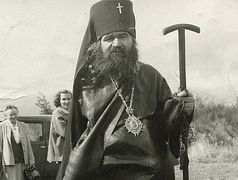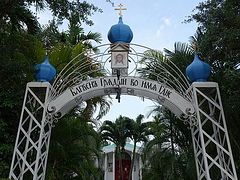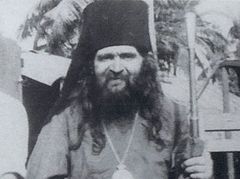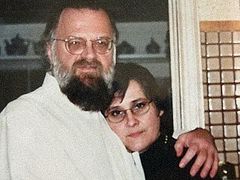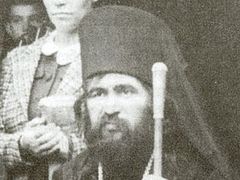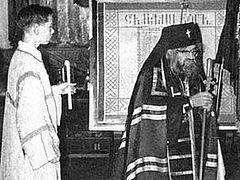This year by the grace of God and through the prayers of the Holy Hierarch John (Maximovitch) of Shanghai Olga Rozhneva, a regular contributor to Pravoslavie.ru, had the opportunity to visit the old and new Orthodox cathedrals in San Francisco; its orphanage originally founded by St. John for Shanghai orphans; to venerate Archbishop John’s holy relics; and to talk to some of his spiritual children.
Below we offer our readers the story of Nicholai Andreevich Lukianov, an altar server of St. John, who speaks about his family and how he met the holy hierarch.
 Nicholai Lukianov and his wife Valentina at the office of the Russian Cathedral of the “Joy of All Who Sorrow” icon of the Mother of God in San Francisco.
Nicholai Lukianov and his wife Valentina at the office of the Russian Cathedral of the “Joy of All Who Sorrow” icon of the Mother of God in San Francisco. My father’s story
My father, who was born in 1904, graduated from the military school in Russkiy (“Russian”) Island near the city of Vladivostok. He fought in the war and as a seventeen-year-old cadet went through Siberia with the Don Regiment. In 1921, they were encircled at Baikal, and elderly soldiers sacrificed their lives so that young soldiers behind them could escape to Manchuria. My grandfather who, like my dad was fighting in that war, was taken prisoner and executed in December 1921. It was much later that we learned about this.
My father managed to get to Manchuria where he worked as a forester. He used to tell us that life was very hard there and many people were unemployed. Every morning a crowd of those seeking employment would gather and wait… All of them were hungry and poorly dressed. One day my dad interceded for his friend who lived in extreme poverty:
“Hire this man today, please!”
And the employer would normally just point his finger at those whom he chose:
“You, you, and you!”
When my father interceded for that man, the employer replied:
“All right. I will hire him today. But now you must leave.”
So he sacked my father who then was very young. After that he moved to Harbin where he lived with his mother (my grandmother), his sister, and younger brother, and all of them had to share one room. He found a new job there. My father used to tell me that on his way back home from work he would take off his only pair of trousers and walk in his underpants, because if he was to wear his trousers out there were no spare clothes.
When the Communists were approaching Harbin, my father and his family fled to Shanghai. In that city my father met my mother, Elena Nikolaevna, who was three years his junior. Her life was full of sorrows as well.
My mother’s story
My mother’s mother (that is, my grandmother) Ekaterina Petrovna was born to a wealthy merchant family. They lived in Kazan. My grandmother became a widow at the early age of twenty-six and was left to take care of her four children. They had barges that transported cargo across the Volga. And my young grandmother did not lose heart and took over her husband’s work. So she raised her children and managed the business on her own.
During the Red Army’s attack, the family had to leave everything and flee. They missed the last ferry and my grandmother’s eldest son (my uncle) rowed a boat after the ferry. With great difficulty they caught up with the ferry and after a dangerous journey finally reached Harbin, from where they later moved to Shanghai.
My parents met in Shanghai. My father learned to be a pharmacist and worked for a pharmaceutical company.
When my grandma was dying in San Francisco, she drew me a map that marked the location of their buried family treasures, with such landmarks as a river, a tree, etc. But I was only eighteen and, of course, lost that map.
The Holy Archbishop John of Shanghai
I was born in 1940 in Shanghai. My parents led an active church life, so from our early childhood my elder brother and I were altar servers of St. John of Shanghai. I did it from the age of five, and knew that he was a special man. Although at that time I did not realize that the archbishop was a saint, I did feel that he was a very special man. He loved us altar boys, was always gentle with us and allowed the youngest ones to sit on his lap. He attracted people, particularly children, with his warmth and affection.
After services, when the archbishop got into the car, the kids would sit down next to him: about five altar servers would sit behind him, two or three – in front of him, and the youngest child would sit on his lap.
At the same time, during services, not least in the altar, the archbishop was strict. He was a true ascetic and ate only once a day—late in the evening. He was not a tall man (his height was about five feet and three inches).
St. John in San Francisco
When we came to San Francisco, the authorities did not recognize my father’s diploma as a pharmacist, so he had to get a job as a janitor in an office. It was in San Francisco that my two younger brothers were born.
I was St. John’s altar server there, too. We would travel with him to various parishes where he would serve on patronal feasts. Every service was followed by a meal. The place of honor at the table was always occupied by the hierarch, but the holy bishop would not sit down until he made sure that there were enough chairs for everybody. There were usually no seats for us boys, so we would be standing by the door. The archbishop would say, addressing the organizers:
“Where will my altar servers be seated?”
The people would answer him:
“We will find a place for them in the kitchen.”
Then the saint would say:
“I won’t sit down until my altar boys are seated.”
After that the organizers would start seating us around the table, while the archbishop was standing and waiting. At last we occupied our seats and felt very happy as the holy archpastor took care of us.
The archbishop’s return
When St. John was sent to serve in Europe, we first were altar servers of Archbishop Tikhon (Troitsky; 1883-1963) at the old cathedral of San Francisco. When the latter retired, Bishop Nektary (Kontsevich: 1905-1983) became the vicar. Next Archbishop Anthony (Sinkevich: 1903-1996) was sent here from Los Angeles, and it led to a split within the parish. The construction of the new cathedral commenced under Archbishop Tikhon, but due to the split the construction work was suspended and the cathedral stood unfinished for two years.
At the end of 1962 St. John was transferred from Brussels to San Francisco in order to heal this split. In August 1963, St. John was officially assigned to be Archbishop of Western America and San Francisco. In those years the holy hierarch was repeatedly attacked and even underwent a judicial trial, although, of course, the court acquitted him. Nevertheless, these trials and tribulations caused him great sorrow.
We were so happy about the archbishop’s return and began to help him in the altar again. My younger brother, Paul Lukianov (now Archbishop Peter of Chicago and Mid-America, [ROCOR]), served as his cell-attendant and secretary. Archbishop John would stay with our family for dinner once a month.
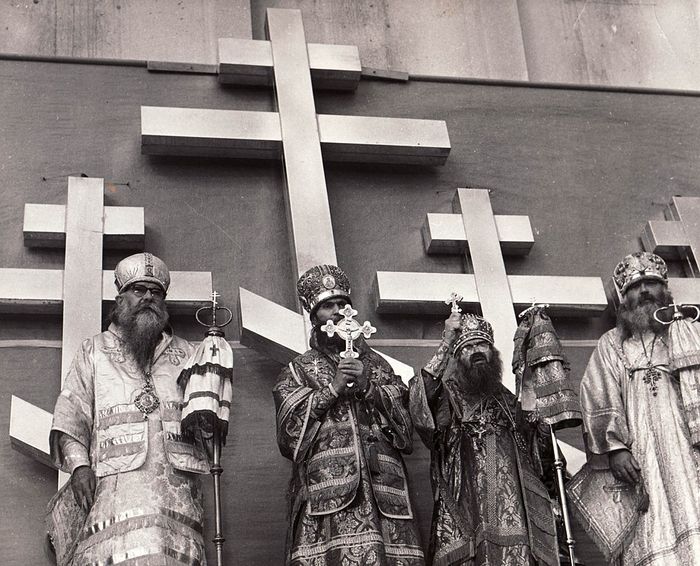 Before the installation of crosses at the new cathedral in San Francisco. On the photo Archbishop John stands third on the left.
Before the installation of crosses at the new cathedral in San Francisco. On the photo Archbishop John stands third on the left. How I disobeyed the archbishop and what came of it
I studied well and was given a recommendation to continue my studies at West Point, a prestigious and very selective military academy (in the state of New York). I was so excited! But when I came to the holy archbishop to ask for his blessing, he refused to give it to me. I was very frustrated and disappointed. I wanted to study at that academy so much, but the archbishop did not give me his blessing! Thus, I disobeyed him.
Before joining the academy it was suggested to me not to attract attention among other new students so that the senior students might not find fault with me. I was told: “Be calm. It will be better if none of the senior students knows your name for the first two or three weeks of your studies.”
On my first day at the academy we were lined up in a rank and asked questions for a questionnaire. I answered all the questions very quickly… All but one! So there was a hitch. I was to tick off my religion and choose from Catholicism, Protestantism, or Judaism. I answered: “I am Orthodox.” But the student in charge was annoyed as there was no “Orthodoxy” in the questionnaire. So he told me to choose from what it had. But I replied: “I am neither a Catholic, nor a Protestant, nor a Jew. I am Russian Orthodox.”
And the queue behind me was growing. The people started shouting:
“What’s the delay?”
In the end I got my own way. I was given a badge with my name, blood group and the word “Orthodox” written on it. But this was achieved by me not without consequences. While I had been cued not to attract attention so that the senior students might not pick on me, from the very first day of my studies at the academy its students referred to me as “that accursed Russian who kept everybody waiting,”
For two weeks I was not allowed to sit at the same table with the academy students at breakfast, lunch, or dinner. They would simply throw me out neck and crop whenever I wanted to sit down, so I remained hungry because it was forbidden to eat standing up. My Polish roommates would bring me some food on the quiet without anybody else’s knowledge.
On top of that, some senior students would come and see if we folded our underwear neatly inside our bedside-tables. And I had a vial of holy water in my bedside-table. My mom had written “Holy water” on it, hoping that they would not take the bottle away from me. When a senior student found the vial, he kicked it and uttered swear words. I couldn’t control myself and hit him. After that incident another senior student (a brawny fellow) would bash me up for several nights in succession, thus “working out” his blows.
There were other incidents. In a word, I endured a great deal of distress at the academy. But the thought that I had disobeyed Archbishop John kept tormenting me more terribly than any humiliation. Thus, a year later I dropped out of the academy, entered a university and learned to be a civil engineer.
“Work well—this place is mine!”
St. John did not bless me to go to West Point, yet he turned my life in another direction. He invited me to the committee on the construction of the new cathedral. So with his blessing I have been constructing it since 1964! But now I am not working for money any more—I am doing it to make a helpful contribution to the common good.
In those years we were responsible for finishing work in the Orthodox school at the cathedral, building lecture rooms and classrooms on the church’s ground floor, along with a storeroom. One day I was smashing concrete in order to remove it and lay pipes. It was dark and dusty there, and I was tired and dirty. Suddenly the archbishop came in and said:
“Work well—this place is mine!”
I didn’t understand those words back then. But after his death we made a burial vault in that very place where the holy hierarch rested until his canonization; thereupon his relics were translated and enshrined in the upper level of the cathedral.
The last conversation
St. John blessed my wife Valya [a diminutive form of the name Valentina] and I for marriage. He loved my Valya dearly and baptized our eldest son Peter.
When the archbishop was visiting Seattle for the last time, he called us at six in the evening on Friday, July 1, 1966. I answered his call and talked with him a little. Then he asked me to invite Valya to the telephone. And we intended to go somewhere that night. While Valya was talking with the archbishop, I was pointing my finger at the watch as if saying, “It’s time to go”. But she was talking with St. John for some time before she hung up. This was our final conversation with the archbishop on the day before his repose.
He reposed in the Lord on the following day, July 2, 1966, during prayer in his cell before the wonderworking Kursk Root icon of the Mother of God, while visiting St. Nicholas parish in Seattle.
And I still blame myself for rushing my wife during her last conversation with Archbishop John.
 St. John with the wonderworking Kursk Root icon of Holy Theotokos, accompanied by Bishop Nektary. 1965.
St. John with the wonderworking Kursk Root icon of Holy Theotokos, accompanied by Bishop Nektary. 1965. How municipal laws were changed within a couple of days
On Saturday, the following day after our talk, we learned about the blessed archbishop’s death. My younger brother (now Archbishop Peter) and I flew to Seattle. It was Saturday evening when we arrived, and all the funeral parlors were closed. Bishop Nektary and my brother vested the archbishop in archpastoral garb. Yura [a diminutive form of the name Yuri] Kalfov, who was among the archbishop’s altar servers, and I tried to obtain documents to transport the saint’s body to San Francisco.
However, the state of Washington in which Seattle is situated had a law allowing transportation of the body of a dead person for up to twenty-four hours after his demise. Otherwise moving the body of the deceased to another state was prohibited, so he could be buried only in the state where he died.
By some miracle we reached an agreement with one funeral home (though all of them were closed) and they delivered a coffin to us on Saturday night. We had time to finalize all the necessary documents and then transported St. John’s body to San Francisco.
San Francisco has no cemetery, and burials within the city are forbidden. But the municipal laws were changed within a couple of days, which was theoretically impossible! The legislation was amended because thousands of believers had appealed to the city administration. So we were allowed to keep the holy relics of St. John at the cathedral.
Holy Father John, pray to God for us!
All my sons venerate St. John of Shanghai very much; my wife is a member of the sisterhood, and my grandson Stephen (like me many years ago) is an altar server at the cathedral. It was thanks to St. John that my younger brother chose the path of Church ministry and became a hierarch.
Every day I pray and ask for the intercession of St. John of Shanghai, the Wonderworker of San Francisco.
Holy Father John, pray to God for us!













